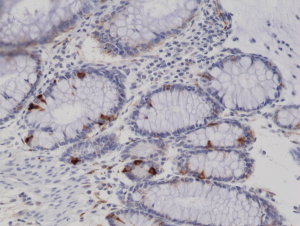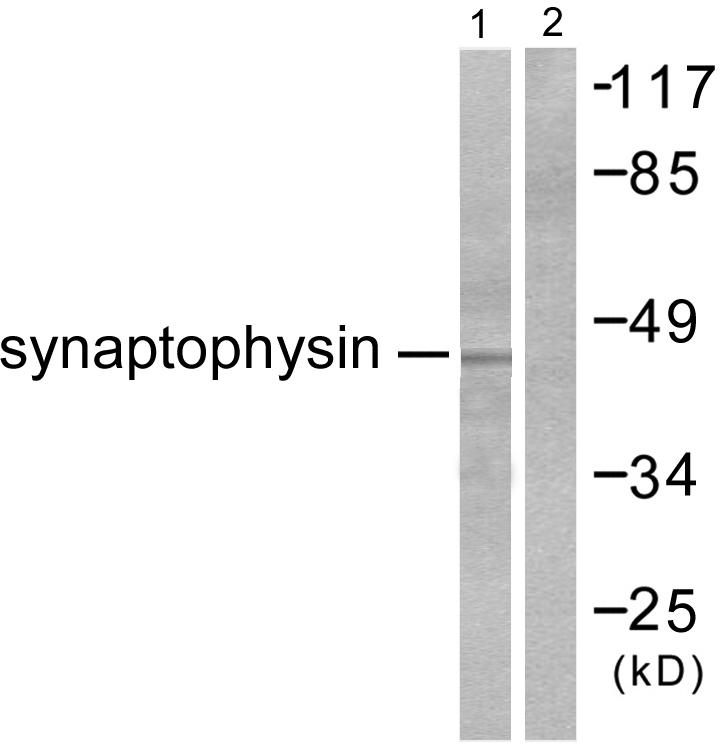
Immunohistochemical staining of formalin fixed and paraffin embedded human colon tissue sections using anti-Synaptophysin rabbit monoclonal antibody (Clone RM258) at a 1:200 dilution.
anti-Synaptophysin (human), Rabbit Monoclonal (RM258)
REV-31-1139-00
ApplicationsWestern Blot, ImmunoHistoChemistry
Product group Antibodies
ReactivityHuman
TargetSYP
Overview
- SupplierRevMAb Biosciences
- Product Nameanti-Synaptophysin (human), Rabbit Monoclonal (RM258)
- Delivery Days Customer2
- ApplicationsWestern Blot, ImmunoHistoChemistry
- CertificationResearch Use Only
- ClonalityMonoclonal
- Clone IDRM258
- Gene ID6855
- Target nameSYP
- Target descriptionsynaptophysin
- Target synonymsMRX96, MRXSYP, XLID96, synaptophysin, major synaptic vesicle protein P38
- HostRabbit
- IsotypeIgG
- Protein IDP08247
- Protein NameSynaptophysin
- Scientific DescriptionRecombinant Antibody. This antibody reacts to human Synaptophysin. Applications: WB, IHC. Source: Rabbit. Liquid. 50% Glycerol/PBS with 1% BSA and 0.09% sodium azide. Synaptophysin (major synaptic vesicle protein p38) is a calcium-binding and integral membrane glycoprotein present in presynaptic vesicles in almost all neurons. Synaptophysin has four transmembrane domains and it forms a complex with dynamin at high calcium concentrations suggesting an involvement in synaptic vesicle endocytosis. It is also involved in the regulation of short-term and long-term synaptic plasticity. Synaptophysin is currently the most widely used marker for nerve terminals and for differentiating neuroendocrine tumors and its ubiquity at the synapse has led to the use of synaptophysin immunostaining for quantification of synapses. Mutations in the gene can result in mental retardation, increased exploratory behavior, impaired object novelty recognition and reduced spatial learning. Using immunohistochemistry, synaptophysin can be demonstrated in a range of neural and neuroendocrine tissues, including cells of the adrenal medulla and pancreatic islets. As a specific marker for these tissues, it can be used to identify tumours arising from them, such as neuroblastoma, retinoblastoma, phaeochromocytoma, carcinoid, small-cell carcinoma, medulloblastoma and medullary thyroid carcinoma. - Synaptophysin (major synaptic vesicle protein p38) is a calcium-binding and integral membrane glycoprotein present in presynaptic vesicles in almost all neurons. Synaptophysin has four transmembrane domains and it forms a complex with dynamin at high calcium concentrations suggesting an involvement in synaptic vesicle endocytosis. It is also involved in the regulation of short-term and long-term synaptic plasticity. Synaptophysin is currently the most widely used marker for nerve terminals and for differentiating neuroendocrine tumors and its ubiquity at the synapse has led to the use of synaptophysin immunostaining for quantification of synapses. Mutations in the gene can result in mental retardation, increased exploratory behavior, impaired object novelty recognition and reduced spatial learning. Using immunohistochemistry, synaptophysin can be demonstrated in a range of neural and neuroendocrine tissues, including cells of the adrenal medulla and pancreatic islets. As a specific marker for these tissues, it can be used to identify tumours arising from them, such as neuroblastoma, retinoblastoma, phaeochromocytoma, carcinoid, small-cell carcinoma, medulloblastoma and medullary thyroid carcinoma.
- ReactivityHuman
- Storage Instruction-20°C,2°C to 8°C
- UNSPSC41116161









![Synaptophysin antibody detects Synaptophysin protein at synaptic vesicles by immunofluorescent analysis. Sample: DIV9 rat E18 primary cortical neurons were fixed in 4% paraformaldehyde at RT for 15 min. Green: Synaptophysin protein stained by Synaptophysin antibody (GTX100865) diluted at 1:500. Red: beta Tubulin 3/ Tuj1, stained by beta Tubulin 3/ Tuj1 antibody [GT11710] (GTX631836) diluted at 1:500. Blue: Fluoroshield with DAPI (GTX30920).](https://www.genetex.com/upload/website/prouct_img/normal/GTX100865/GTX100865_40128_20170503_IFA_R_w_23060100_733.webp)